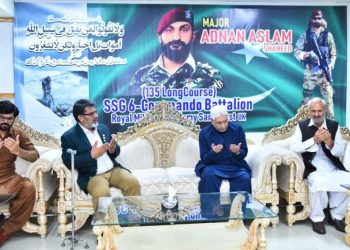WNAM REPORT: Islamabad, Federal Minister for Planning, Development & Special Initiatives, Ahsan Iqbal, addressed the ASEAN-Pakistan Technology Expo 2025 as the Chief Guest at the National University of Sciences and Technology (NUST). The two-day event brought together distinguished delegates from ASEAN member states, academia, industry leaders, and students to foster collaboration in science, technology, and innovation.
Umar Khan, Project Director of the National Centre of Robotics and Automation (NCRA) at NUST, acknowledged the pivotal role of Minister Ahsan Iqbal in establishing key national research centers. He highlighted that the NCRA, along with the National Centre of Artificial Intelligence, National Centre of Big Data and Cloud Computing, National Centre of Cyber Security, and the National Centre of GIS and Space Applications, were all launched in 2017-2018 as part of the Minister’s vision to propel Pakistan into a technology-driven future. He noted that Minister Iqbal’s unwavering dedication has transformed these initiatives into thriving ecosystems of innovation, commercialization, and national impact.
Minister Ahsan Iqbal underscored the significance of the Expo as a symbol of shared commitment between Pakistan and ASEAN nations to harness the transformative power of technology. He emphasized the dual nature of technological change, which offers immense promise but also presents serious challenges. From artificial intelligence to clean energy, Minister Iqbal noted that disruptive innovations are reshaping global economies and societies, and highlighted the risks posed by the growing technology gap, digital divide, and skills mismatch in developing regions.
Minister Iqbal outlined the common challenges faced by Pakistan and ASEAN countries, including climate change, youth unemployment, and uneven digital infrastructure, while also pointing to shared strengths such as a young and tech-savvy population, robust universities, and a growing appetite for innovation. He stated that this synergy forms the foundation for deeper cooperation in science and technology.
Reaffirming Pakistan’s strong commitment to its partnership with ASEAN, Minister Iqbal proposed a forward-looking vision for ASEAN-Pakistan technology collaboration. He outlined three strategic pillars to drive this agenda: fostering knowledge and talent exchange through academic partnerships and innovation fellowships; building joint research and development platforms in emerging fields; and ensuring that technology contributes to sustainable and inclusive development, particularly in areas such as climate resilience, health, and education.
The Minister also highlighted recent milestones in Pakistan’s journey toward a knowledge-based economy. These include the launch of the National AI Policy, the creation of Special Technology Zones to attract global investment, the digitization of governance through the E-Pakistan initiative, and the strengthening of institutions like NUST and Ignite to support startups and applied research.
He emphasized that the future must be built through cooperation, innovation, and shared vision. Commending NUST for its leadership in technology education and research, he called upon the youth to develop technologies that serve not just markets, but the greater public good. The Minister expressed hope that the ASEAN-Pakistan Technology Expo would mark the beginning of a new era of collaboration, shaping a smarter, greener, and more inclusive future for the region.
In his concluding remarks, Minister Ahsan Iqbal issued a compelling call to action, urging all stakeholders to reimagine ASEAN-Pakistan relations not merely through the traditional lenses of trade and diplomacy, but as a dynamic technology alliance for inclusive and sustainable prosperity. He also proposed the following action steps for consideration at EXPO 2025:
1. Establish an ASEAN-Pakistan Technology Cooperation Forum that convenes annually to identify joint initiatives, exchange innovative ideas, and evaluate collaborative progress.
2. Launch an ASEAN-Pakistan Startup Bridge aimed at connecting incubators, venture capitalists, and entrepreneurs across the region to foster a vibrant cross-border innovation ecosystem.
3. * Promote the development of regional standards and interoperability * in digital technologies to enable efficient, seamless collaboration and integration among member states.
4. Encourage the co-hosting of technology expos, hackathons, and innovation challenges that actively crowdsource solutions to shared developmental challenges and stimulate youth-led innovation.
5. Institutionalize a structured digital dialogue bringing together policymakers, academia, industry leaders, and young innovators to ensure that technology policies remain inclusive, future-oriented, and people-centered.








